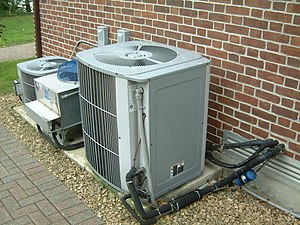#1. Use smart strips. Every day appliances consume energy even when they’re turned off. Microwaves, coffee makers, computers, televisions, the list goes on and on. Rather than let this valuable energy go to waste, plug your appliances and electronic equipment into a smart strip. A smart strip is a strip of outlets with an off/on switch. When you’re not using the appliances and equipment, say at night when you’re asleep, simply turn the smart strip off. You’ll save thousands of watts each year.
| English: Compact fluorescent light bulb (Photo credit: Wikipedia) |
#3. Adjust your thermostat. Simply adjusting it a few degrees lower in the winter and higher in the summer will save energy. A programmable thermostat makes it easy.
#4. Dry dishes naturally. If you use automatic drying with your dishwasher, turn it off, open the door, and let your dishes air dry.
#5. Lower your water heater temperature. Your water heater uses energy to keep your water hot and ready for those steamy showers. Turn it down to 120 degrees. Your water will still be good and hot, certainly hot enough for a steamy shower, and yet not too hot to scald. And you’ll save energy.
#6. When replacing appliances, look for energy star appliances. They conserve energy and many communities offer rebates and credits when you purchase these appliances.
#7. If you have a fireplace, make sure the damper works well and is closed when not in use. You can lose a significant amount of heat during the winter and cool air during the summer through an open fireplace damper.
| Air conditioner. (Photo credit: Wikipedia) |
#9. Embrace passive solar. The sun is fantastic for heating and lighting our homes. If your home has a southern exposure you can harness the power of the sun to heat your home in the winter and to provide daylight year round. Eastern exposures can open the curtains in the morning to heat and light the home and western exposures can open the curtains in the afternoon (or close them in the summer to keep the house cool).
#10. Check your insulation. Too much insulation causes your energy to be lost through your windows while too little insulation causes energy to be lost through your roof or attic.
Home energy savings doesn’t have to require a home overhaul. A few simple steps can save you hundreds of dollars a year and conserve energy, reducing fossil fuel usage and pollution.



No comments:
Post a Comment